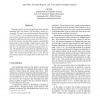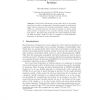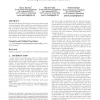14 search results - page 2 / 3 » A probabilistic analysis of a leader election algorithm |
IPPS
2007
IEEE
13 years 11 months ago
2007
IEEE
This paper deals with the self-stabilizing leader election algorithm of Xu and Srimani [10] that finds a leader in a tree graph. The worst case execution time for this algorithm ...
ASIAN
2003
Springer
13 years 10 months ago
2003
Springer
Protocols for distributed systems make often use of random transitions to achieve a common goal. A popular example are randomized leader election protocols. We introduce probabilis...
SAC
2009
ACM
13 years 9 months ago
2009
ACM
Experimental studies have shown that electing a leader based on measurements of the underlying communication network can be beneficial. We use this approach to study the problem ...
ENTCS
2002
13 years 5 months ago
2002
We report on the automatic verification of timed probabilistic properties of the IEEE 1394 root contention protocol combining two existing tools: the real-time modelchecker Kronos...
LICS
2003
IEEE
13 years 10 months ago
2003
IEEE
Probability features increasingly often in software and hardware systems: it is used in distributed co-ordination and routing problems, to model fault-tolerance and performance, a...




